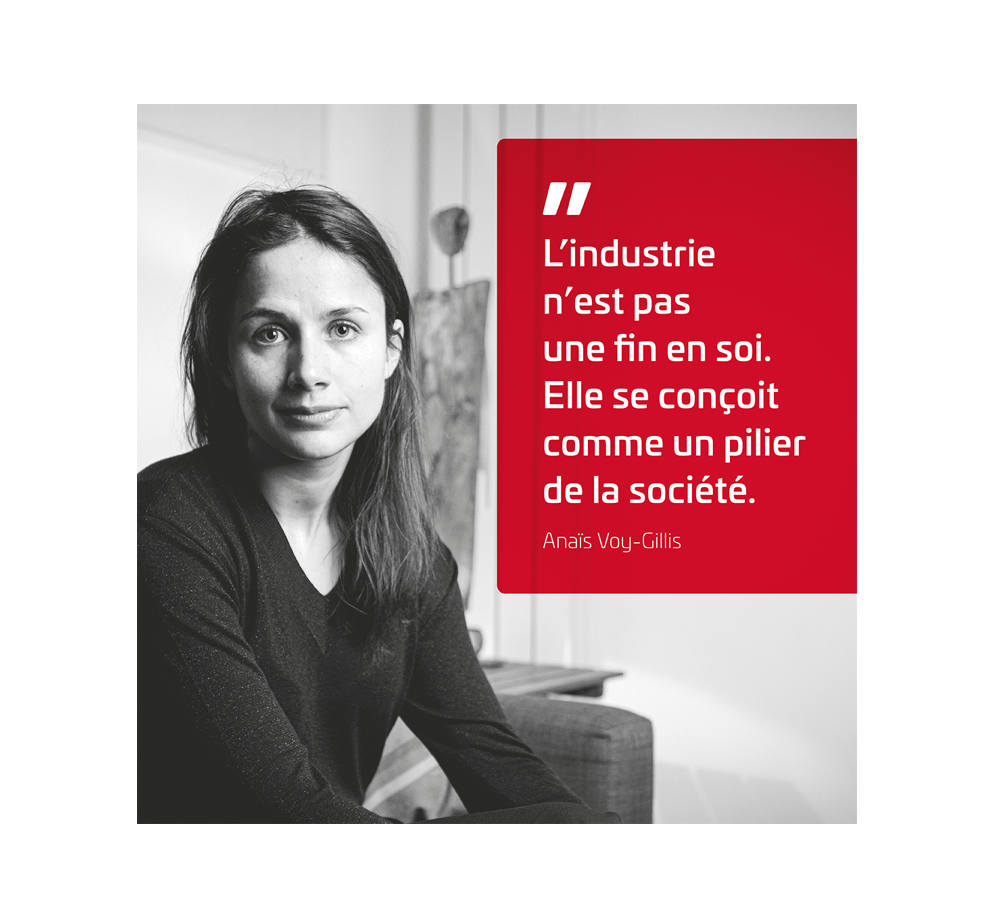“Industry is not an end in itself. It is a pillar of society.

Anaïs Voy-Gillis is one of the new voices of industry in France.
She has a doctorate in geography from the French Institute of Geopolitics, is a research associate at IAE Poitiers and is Associate Director of June Partners. Her research focuses on industry and the challenges of reindustrialising France.
She is the author of the book “Vers la renaissance industrielle”, co-authored with Olivier Lluansi.
ForHum: What is the current state of the industry in France?
For a long time, industry was excluded from our vision of society. Between 1980 and 2000, we thought we could be a country without factories by concentrating on upstream and downstream production tasks. These choices have led to a loss of value, with many factories closing down, and have had serious consequences for some industrial areas. This has led to a loss of economic control and independence, with an increase in international sourcing.
The pandemic and the war in Ukraine have served as a reminder of France’s dependence, with the many supply disruptions we have experienced.
Today, at a time when there is a strong desire to reindustrialise, we need to ask ourselves the central question for me: what industries do we want in France to serve what kind of society?
ForHum: What are the major challenges facing the industry today?
The first is the modernisation of production sites, many of which have suffered from de-industrialisation and are therefore ageing. This is an obstacle to meeting changing demand.
The second is the environment, with priority given to decarbonising production sites, but there are other challenges such as preserving biodiversity and drastically reducing water consumption.
This is directly linked to a third challenge, that of integrating industry into the life of the wider community. In the landscape and in everyday life.
The industry needs to be more open. Finally, the last challenge is that of digital technology and Data. This challenge has already been taken up by a large number of companies, particularly since the start of the pandemic. These challenges, particularly decarbonisation, will require access to low-carbon energy at controlled prices.
ForHum: How can the industry meet these challenges?
It needs to reinvent itself. By its very nature, industry is diffuse and often invisible. Many industrial sites are far removed from the images we have of industry. We need to raise the profile of industry by opening up our sites and proposing new stories and new faces. The discourse of the major players is often centred on specific issues such as lower costs. We need to move towards a more positive approach that makes people want to get involved, without denying the arduous nature of some jobs. The paradox is that a lot of things come from industry, but there is little acceptance of industrial sites. I have noticed, however, that this question of acceptability has not yet been addressed in discussions on reindustrialisation.
ForHum: Where will the response come from?
France needs a national project. A real industrial vision of where we want to go. Industry is not an end in itself. It is a pillar of a social project.
The question of which industries we want to develop and which we want to repatriate is fundamental, provided we first define the ambitions we want to serve. We need a vision for society and then targeted policies.
Today we have “France 2030”. It sets out broad objectives, but when you get down to the nitty-gritty, it’s hard to see how we’re going to get there, how we’re going to measure the objectives. A lot of this is done through calls for expressions of interest, which SMEs are struggling to take up.
There is a risk that the major players will capture a large proportion of the funding, to the detriment of innovative SMEs and SMIs. We also need to ensure that these funds benefit the whole of France and avoid concentration in a few major cities.
ForHum: How are new industrial companies like Hoffmann Green contributing to this industrial revival?
The new generation is thinking up projects to respond to societal challenges. This is the case of Hoffmann with its decarbonised cements. As are Ynsect, Lhyfe and Néolithe. These young companies are using an industrial approach to address environmental issues. They are responding to the challenge of repositioning industry as part of a vision for society.
ForHum: How can this transformation towards a desirable industry be achieved?
Manufacturers need to maintain a dialogue with society. Education is needed to strengthen the culture of materials. We need to open up factories to show what industry is all about. We need to show how industry contributes to the life of the city, so that everyone – individuals, companies and institutions – thinks about what they buy.
Buying French means supporting employment and regional development. And it means participating in a shared social project. This brings us back to this fundamental aspect. To have a desirable industry, it has to be part of a social project.
This interview is taken from pages 42 and 43 of our ForHummagazine , which is currently available for free consultation on our website.